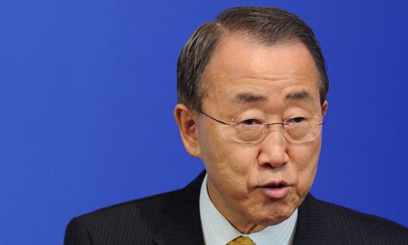Flanked by a guard wearing a white UN helmet, Ban was welcomed at the airport by Prime Minister Abdiweli Mohamed Ali on the first visit by a UN chief to Mogadishu, often described as the world’s most dangerous city, in alsmost two decades.
“We call on the opposition armed group Al-Shebab to stop violence and participate in the peace process in the country,” Ban told reporters here after meeting Somalia’s transitional leadership.
After making a brief visit to the African Union mission (AMISOM) at its airport base, AU forces escorted him through the bombed-out city to the presidential palace.
“Security is tightened and everything is under control,” Mohamed Abdirahman Ali, a Somali government security official, said.
He said his visit was the first to Mogadishu since 1993, when the world body still had a large Somalia peacekeeping force, whose deployment was considered a debacle and left a lasting trauma among Western military planners.
Somali President Sharif Sheikh Ahmed, who had earlier been reported to be out of the country, said the visit “encourages peace and development” and “demonstrates how security has improved in Mogadishu.”
The city has nonetheless seen an increase in grenade and roadside bomb attacks since Shebab abandoned fixed positions there in August and switched to guerrilla tactics against the Western-backed government.
But Ban’s visit also comes at a time when pressure is growing on the Shebab, as pro-government Somali forces are now backed not just by AMISOM in Mogadishu, but also by Kenyan troops in the south and Ethiopian soldiers in the West.
The most high-profile visits to Mogadishu recently were by Turkish Prime Minister Recep Tayyip Erdogan in August and by Ugandan President Yoweri Museveni, who last year became the first foreign head of state to travel to the Somali capital since the country’s civil war began in 1991.
Museveni’s troops form the backbone of the 9,700-strong AMISOM, which has allowed Sharif’s weak Transitional Federal Government to survive but has failed to stamp out the Shebab-led insurgency.
The other half of the contingent is provided by Burundi but Ban, speaking in Nairobi on Thursday, welcomed Kenya’s plans to “re-hat” its military intervention in the south and bring the troops under AMISOM command.
Kenya’s contribution would help bring the force to its full authorised capacity of 12,000.
Nairobi unilaterally sent troops across its border with southern Somalia in October in what it said was a move to contain attacks by the Shebab, whom it blamed for a spate of kidnappings that have dealt to a blow to Kenyan tourism.
Next year is set to mark the end of what will by then be an eight-year Somali transitional administration that has failed to fulfil most of its key objectives.
Ban said the UN’s political office for Somalia, which has so far been operating out of Nairobi, would open in Mogadishu next month.
“The UN will also open its political office in Mogadishu in January next year,” he said.
The transitional Somali government was formed in neighbouring Kenya in 2004 with a five-year mandate to reconcile the conflict-shattered country, write a new constitution and hold elections.
While the UN has so far resisted calls by the African Union to take over peace operations in Mogadishu and the rest of the country, it has continued to deliver humanitarian services, despite security concerns.
The Horn of Africa was hit this year by its worst drought in decades and the UN has described Somalia as facing the world’s most severe humanitarian crisis, putting a quarter of a million people at risk of starvation.
The UN refugee agency said in November that an estimated 330,000 Somalis have fled drought and conflict in their homeland since January alone for neighbouring states including Kenya, Ethiopia, Yemen and Djibouti.










































